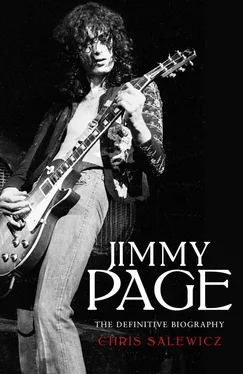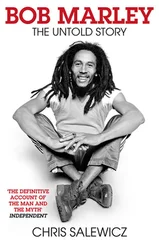‘No, no. For the last 18 months.’
Do you play for a regular group yourself?
‘Yes: Neil Christian and the Crusaders.’ [By now Page was no longer playing with them.]
And what sort of things do you do with this group?
‘Well, we do one-night stands all over England.’
What are the big names that you have backed on disc?
‘Jet Harris and Tony Meehan, Eden Kane, Duffy Power.’
What is it like working with some of the really big names of show business?
‘Disappointing.’
Why is that?
‘Well, they don’t come up to how you expect them to be. Rather disappointing on the whole, I would say.’
That’s probably bad news for some record fans. What is your professional ambition? Do you want to be a guitarist all the time? Do you want to make your own records?
‘No, not necessarily. I’m very interested in art. I think I’d like to become an accomplished artist.’
Rather than a guitarist?
‘Yes, possibly.’
Is this a means to an end for you? Are you hoping to earn enough money through your guitar playing?
‘Yes. Yes. I’m hoping to finance my art by the guitar.’
The quality of the acts Page worked with built steadily. Carter-Lewis and the Southerners’ ‘Your Momma’s Out of Town’ was an early example. ‘He was a fast player, he knew his rock ’n’ roll and he added to that,’ said John Carter. ‘He was also quiet and a bit of an intellectual.’
John Carter and Ken Lewis were essentially songwriters, with a sub-career as backing singers: the first hit they wrote was ‘Will I What?’, the number eighteen follow-up to Mike Sarne’s 1962 novelty number one hit ‘Come Outside’. They had been persuaded to form Carter-Lewis and the Southerners to promote their material. As a session musician Page played guitar on ‘That’s What I Want’, a Carter-Lewis song that became a Top 40 hit in 1964 for the Marauders, a group from Stoke-on-Trent. Then Page briefly became an actual member of the group. Viv Prince, later drummer with the Pretty Things, played with the group while Page was with them, along with Big Jim Sullivan and drummer Bobby Graham. By 1964 Carter-Lewis and the Southerners would become the Ivy League and then magically transform into the Flower Pot Men, who in 1967 hit the UK number four slot with ‘Let’s Go to San Francisco’.
Page also played on records as diverse as ‘Walk Tall’ by Val Doonican, a kind of Irish Perry Como, and – on 6 November 1964 – with another Irish singer, Them vocalist Van Morrison, on the Belfast group’s ‘Baby, Please Don’t Go’, its B-side ‘Gloria’, and follow-up single ‘Here Comes the Night’.
The twin pillars of Them were Van Morrison and guitarist Billy Harrison. ‘We were brought over,’ said Harrison, ‘in the middle of 1964 and stuck in Decca’s West Hampstead studio to see what we had. We did “Baby, Please Don’t Go”, “Gloria” and “Don’t Stop Crying Now”, which was released as the first single and died a death.’
The sessions were produced by Bert Berns, a streetwise New Yorker who had become a songwriter and record producer of some significance; a crucial figure at Atlantic Records – he revived the career of the Drifters and brought Solomon Burke to the label – he would later run Atlantic’s BANG label, kickstarting the solo careers of Van Morrison and Neil Diamond. At first, influenced by Jerry Leiber and Mike Stoller, the white songwriting team from Los Angeles who via their cartoon-like wit transformed the subject matter of rhythm and blues, Bert Berns had been a composer of considerable success, subtly lacing his tunes with hypnotic Latin influences, especially mambo. Installed in New York’s famous Brill Building, the endlessly and effortlessly enthusiastic Berns co-wrote the Isley Brothers’ ‘Twist and Shout’, Solomon Burke’s ‘Everybody Needs Somebody to Love’, The Exciters’ ‘Tell Him’, Them’s ‘Here Comes the Night’ and the McCoys’ ‘Hang On Sloopy’, among many others. (As befitted the sometimes sleazy, occasionally Mob-affiliated world of New York popular music, Bert Berns, who everyone found a fabulous human being, attractive and glamorous to those with a fondness for boho chic, was allegedly ‘connected’, and possibly even a ‘made man’. From his rarefied perspective he would have given Page interesting instruction about the US music business. At their first sessions Led Zeppelin recorded a song about him, ‘Baby Come On Home’, subtitled ‘Tribute to Bert Berns’, an exceptionally beautiful soul tune of precisely the type Berns would have produced for Atlantic, which was not released until 1993. In Page’s guitar playing on this 1968 recording you can hear his love for Bert Berns.)
It was Bert Berns’s writing of the song ‘Twist and Shout’ that had first brought him to London. Covered by the Beatles, with John Lennon’s extraordinary, searing performance taking the song to a show-stopping further level, ‘Twist and Shout’ closed Please Please Me , the Liverpool group’s first album, the number one LP in the UK for 30 weeks in 1963. Although the Beatles meant nothing in America at that time, Berns’s first royalty cheque for his song on the album was for $90,000. In October 1963 he came over to London to see what was going on, producing a handful of no-hoper acts.
Already working in the British capital was Shel Talmy. A Los Angeleno who had worked with Capitol Records, he had been hired as staff producer by Dick Rowe, the Decca head of A&R – the man who famously turned down the Beatles but redeemed himself somewhat by signing the Rolling Stones. Rowe now decided that Bert Berns might fit as producer with the Belfast act he had signed named Them.
‘Twist and Shout’ had been covered yet again, by Brian Poole and the Tremeloes, who turned it into a Top 10 UK hit for Decca Records. It was something of a revenge release, as the act had been signed by Dick Rowe in preference to the Beatles – Brian Poole and the Tremeloes were, after all, from Essex, which was far more geographically convenient for a Londoner like Rowe than Liverpool.
In London, where he and Talmy were the only American producers working, Bert Berns had secured work through Decca Records, taking on ‘Little Jimmy’ Page as his principal session guitarist, recognising his talent and befriending him. ‘With the new breed of British producers such as Mickie Most or Andrew Loog Oldham trying as hard as they could to make records that sounded American,’ wrote Berns’s biographer Joel Selvin, ‘Berns was the first American producer trying to make records that sounded British.’
The sessions with Them for Decca proved as much, the resulting recorded songs utterly unique in the resounding clarity of their sound. ‘Bert Berns was inveigled into producing the session,’ said Billy Harrison. ‘And he brought in Jimmy Page, and Bobby Graham on drums. There was much grumbling, mostly from me, because I felt we could play without these guys. Jimmy Page played the same riff as the bass, chugging along. I played the lead: I wrote the riff.
‘Bert Berns had arguments with us about the sound. I thought we were playing it okay: if someone brought in session men you took it as a bit of a sleight. I was very volatile in those days.
‘There were various rows. Jimmy Page didn’t really seem to want to talk to anybody. Just a stuck-up prick who thought he was better than the rest of the world. Sat there in silence. No conversation out of the guy. No response.’
Possibly Billy Harrison was misinterpreting the shyness that other musicians felt characterised the quiet Jimmy Page. And he may have been projecting his personal prejudices. ‘He seemed above everybody, above these Paddies. That was the days when guest houses would have a sign up: “No salesmen, no coloured, no Irish”. Page had that sort of sneering attitude, as though he was looking down on everybody. He’s a fabulous technician, but there’s nothing wrong with a bit of friendliness.’
Читать дальше












